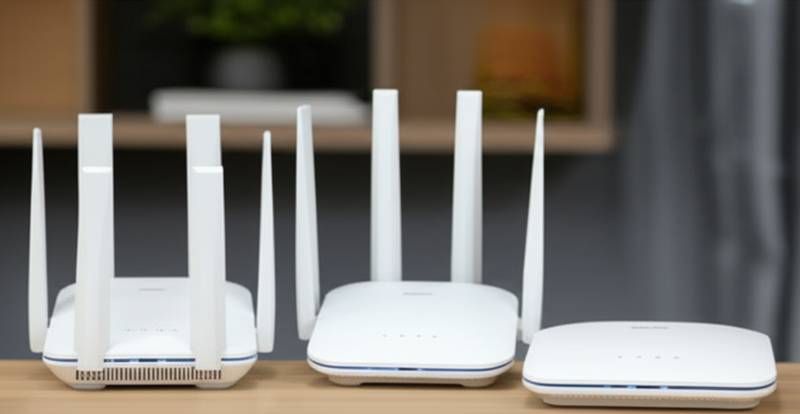WiFi 7 Mesh Systems Under $200 End the Premium Price Era
Mesh WiFi 7 systems have entered an exciting phase, where high performance meets everyday affordability. For too long, advanced networking solutions carried premium price tags that limited access to tech enthusiasts and large households with deep pockets. Now, several manufacturers offer complete mesh kits for under $200, delivering speeds that rival more expensive options while covering typical home layouts effectively. These systems provide multi-gigabit connections, eliminate frustrating dead zones, and maintain low latency even during peak usage hours. Homeowners can now upgrade their networks without compromising on quality or stretching their budgets.
This development marks a significant evolution in home connectivity. Manufacturers recognize that most users need reliable WiFi for streaming, remote work, and smart devices, rather than enterprise-level features. As a result, these budget systems focus on essential capabilities that solve common problems, such as inconsistent signals in multi-story homes or interference from neighboring networks. Users who have dealt with buffering during family movie nights or dropped connections in video meetings will find these upgrades transformative.
Why WiFi 7 Delivers Real Value for Modern Households
WiFi 7 introduces efficiencies that go beyond basic speed improvements, creating networks that handle demanding tasks with ease. The standard incorporates advanced channel management, which minimizes interference and allows multiple devices to operate simultaneously without performance drops. In a household with smart thermostats, security cameras, and several streaming devices, this means consistent responsiveness across all connections. For instance, gamers experience reduced ping times, often below 10 milliseconds, while remote workers upload large files quickly and maintain clear video feeds.
Industry trends indicate that average homes now connect over 20 devices, from smartphones to appliances. WiFi 7 mesh systems address this growth by supporting up to 100 simultaneous connections in budget models, ensuring no single device monopolizes bandwidth. This capability proves especially useful in shared living spaces, where multiple users might stream 4K content or participate in online classes at the same time.
Essential Features in Affordable WiFi 7 Mesh Systems
When selecting a system under $200, prioritize features that align with your home's needs while avoiding unnecessary add-ons. Focus on these key elements to maximize value:
- Tri-band configurations that distribute traffic across multiple frequencies, optimizing for both speed and range.
- Coverage extending to 2,500 to 4,000 square feet with two or three nodes, suitable for apartments or two-story houses.
- Capacity for 50 or more devices, with automatic bandwidth allocation to prevent slowdowns.
- Intuitive mobile apps for setup in under 15 minutes, including network monitoring and guest access controls.
- Compatibility with existing WiFi 6 devices, allowing gradual upgrades without immediate replacement of all hardware.
These attributes ensure the system remains relevant for years, as emerging technologies like augmented reality applications demand more robust networks.
Leading Options in Budget WiFi 7 Mesh Systems
Several brands have launched competitive offerings that balance cost and performance. Each provides unique strengths, making it easier to choose based on specific requirements.
-
TP-Link Deco BE Series
TP-Link leads in democratizing advanced tech, and their Deco BE kits exemplify this approach. A two-node setup covers up to 3,000 square feet with dual-band WiFi 7, supporting speeds over 2 Gbps for seamless 4K streaming and online gaming. The app simplifies configuration, offering real-time diagnostics and built-in parental controls that let you set time limits or block sites without extra fees. -
Tenda Nova BE Mesh
Tenda emphasizes simplicity in their Nova BE line, with two-node kits priced well under $200. Users can expect plug-and-play installation that takes minutes, delivering reliable coverage for medium homes and handling up to 60 devices. The interface includes basic security features, such as automatic firmware updates, which protect against common vulnerabilities. -
Reyee WiFi 7 Mesh
Reyee brings professional-grade tools to consumer budgets, with systems that include advanced traffic shaping for prioritized devices. Their affordable kits offer expansive coverage and customizable settings, ideal for households with heavy smart home integration. Security options, like intrusion detection, add peace of mind without complicating the user experience. -
Mercusys BE Mesh Kit
As an extension of TP-Link's budget line, Mercusys delivers WiFi 7 at prices often below $150. These kits provide dual-band performance for small to medium spaces, with app-based management that includes easy node addition for future expansion. They excel in environments with moderate device counts, ensuring stable connections for daily tasks.
Implementing WiFi 7 in Your Home Setup
To integrate a WiFi 7 mesh system effectively, start by assessing your current network pain points, such as weak signals in certain rooms. Position the main node near your modem and place satellites in high-traffic areas, aiming for even distribution. After setup, test connections in various locations and adjust node placements if needed to optimize coverage. Within a week, you should notice improvements in speed and reliability, with measurable outcomes like faster download times and fewer interruptions.
For smart homes, pair the system with compatible devices to create automated routines, such as lights that activate based on motion sensors without lag. Gamers can configure quality-of-service settings to prioritize console traffic, reducing latency during competitive play. Remote workers benefit from stable uploads, often completing large transfers in half the previous time.
The Broader Impact on Home Networking
This influx of affordable WiFi 7 mesh systems signals a market shift toward inclusive technology. Competition among brands drives innovation, resulting in better features at lower costs. Households that previously settled for outdated routers can now access modern solutions that enhance daily life, from uninterrupted entertainment to efficient work-from-home setups.
Key Considerations for Your Upgrade
Mesh WiFi 7 systems under $200 represent an opportunity to modernize your home network affordably. They eliminate common issues like dead zones and high latency, supporting numerous devices with minimal effort. If budget constraints have delayed your upgrade, explore these options to achieve a responsive, future-ready setup. Home connectivity continues to evolve, becoming more accessible and capable for all users.
